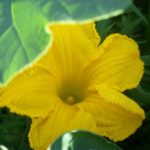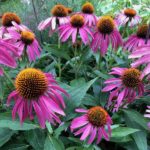
Happy Full Moon – June 16, 2022
Milkweed
You may be familiar with the milkweed family as it produces unique and beautiful flowers followed by a showy display of seeds in the fall. Large seed pods open to release thousands of seeds attached to soft cottony threads. The threads are buoyant so they can take to the air. This makes them great for stuffing pillows and quilts. And apparently, they were used to line life jackets during World War II. A quick check on Etsy and Pinterest reveals that people are blending milkweed with other fibers to create yarn. Milkweed fiber alone will create a brittle thread, but lends its characteristic softness when blended with others.

And there is much to love about this plant in the garden. The flowers attract hummingbirds and all types of butterflies. They also attract beneficial insects that keep insect pests in check. Milkweed is drought tolerant because of its long taproot and that is a bonus, especially where I live in Denver, Colorado.
Essentiality
But the most important thing to know about milkweed is that it is essential to the survival of monarch butterflies. Monarch butterflies can feed on many different flowers, but the caterpillars must have milkweed to survive. Urbanization and increased herbicides have reduced the availability of this essential food. Organizations like Save Our Monarchs are educating the public about the importance of planting milkweed. If you have an area of your yard you can devote to this plant, you’ll be rewarded with flowers, fluff, butterflies, and pollinators. Just be sure to choose a variety recommended for your specific area. Tropical varieties available at some garden centers will flower longer, encouraging the monarchs to linger and not migrate, resulting in their deaths.
Mindful Contemplation on Milkweed & What is Essential
Milkweed holds the energetic quality of essentiality. There are many directions to go with this concept, starting with the plant itself. If you pass this plant in your garden or while walking, stop to appreciate not only its beauty but its essential connection to the life cycle of monarchs. Think for a moment about the fragility of this connection between butterfly and plant. Imagine having only one source of food essential to your being. Contemplate also the human activities that have contributed to the loss of this essential plant and how that might be remedied.

Widening your contemplative practice, you could consider the things that are essential to you. In our consumer culture, it is easy to confuse what is essential with what we simply want. There is nothing wrong with wanting things, but cultivating an awareness of the difference between wants and needs can lead to a happier and more satisfied life.
We can intentionally take stock of the things that are truly essential. Of course, food, air, water, and shelter are essential to our physical well being. But life is not just about physical well being. Begin to notice what is indispensable to your emotional and mental well being. Things like gardening, animal companions, friendship, community, spirituality, books, and music might be part of your list. We can develop a practice of noting and holding these things in our awareness with gratitude. And the flip side of this practice is to look with mindfulness at the things that are only wants, and consider which we can let go of.
This blog post is part of my lunar blog post series, featuring posts every full moon and new moon. For more information click here.




I love milkweed and thank you for teaching me more about the plant. My few small beds are so small, that I’ve opted for a different milkweed plant than the one you show in your photo. It’s got orange flowers and much smaller in growth height but is listed in the nurseries as a CO native plant called butterfly weed. I have been growing it now mainly through seeds for a few years. I hope that’s not one of the “tropical varieties” that is harmful to Monarchs. Do you have any info? Thank you Joann. Lovely writing about gardens, sustainability of our environment, mindfulness and life.
Debbie, I have the orange variety as well and that is fine for Colorado. They are all such cool plants!